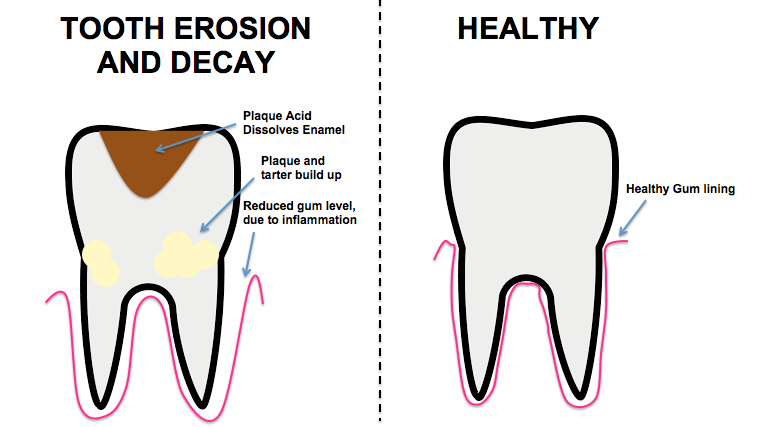Most of us have probably had toothache, cavities, and may have even gotten a tooth filling at one point or another. This does not need to be a recurring theme in our lives: not only is tooth decay preventable, it can also be reversed, if it is noticed in time and appropriate action is taken.
How does tooth decay form on the teeth?
As is the case with the overwhelming majority of dental problems, tooth decay is also a result of improper oral hygiene and unhealthy eating habits.
Foods that contain a high carbohydrate content, and acidic foods and drinks, including sugary sodas, snacking, and improper, ineffective tooth cleaning habits are the main culprits to blame, when it comes to the formation of tooth decay. When teeth are not cleaned properly, the food detritus and the plaque that is stuck on the tooth surface house and feed bacteria that in turn destroy the tooth enamel. This plaque acidifies the mouth, which throws the pH of the mouth all out of whack, and this will start to erode, and eventually, completely dissolve the tooth enamel.

Signs of tooth decay
The problems start at the beginning, as there are no early signs of tooth decay that the patient can feel. As tooth decay usually affects the molars and the hard to reach back teeth, along with the tooth gaps, the visible signs are usually caught much later as well. In the very early stages, white splotches of demineralised zones start to appear on the tooth surfaces, which will adopt a browner and then finally a quite black hue, and these zones will become deeper and deeper, affecting more and more of the tooth surface.
The first symptoms that one actually feels are already a sign of advanced tooth decay, and this point the damage is already done: pain only accompanies tooth decay when the rot has already started to affect the dental nerve, which lies deep beneath the tooth enamel and the dentine. Tooth sensitivity is a warning sign, as sudden sensitivity to changes in temperature or pressure may mean that the tooth enamel is thinning out.
How can we protect ourselves against tooth decay?
If the problem is spotted in time, then the tooth decay that is affecting the tooth enamel can be reversed using fluoride treatments, or by applying the P 11-4 peptide enzyme. The fluoride will strengthen the tooth enamel, so the dentist may decide to offer fluoride tablets, toothpastes or a high fluoride mouthwash. If still in the early stages of tooth decay, than the affected tooth can have its original mineral content restored as a result of peptide based treatment.
If the tooth decay has already reached the dentine though, then there is a real problem, and the only real solution to the inevitable pain you will feel is to get a tooth filling. If the decay is deep enough, than a root canal treatment may become necessary, and the final stages of tooth decay may be so severe that an extraction becomes inevitable.
Prevention is of course the best medicine, and will always work. Here are some things to keep in mind to prevent tooth decay from ever becoming a problem!

How to prevent tooth decay
- Make sure that you are consistent in your oral hygiene routine, and that you keep it up. Brush your teeth around 20-30 minutes after every meal, keeping good tooth brushing technique in mind, and make sure you mind the tooth gaps and the tongue as well. Tools besides your toothbrush, like interdental toothbrushes, dental floss and mouthwash are absolutely mandatory. If you do not have the opportunity to brush after you eat, make sure you have some sugar free gum to chew on, as this will also prevent the formation of plaque.
- Choose the best oral hygiene products! Ask your dentist about what the best toothpaste, toothbrush and mouthwash are for your particular condition. Do not forget to change your toothbrush or the head of your electronic toothbrush every two months.
- Healthy eating habits and good nutrition will also help in your fight against tooth decay. Eating regularly and eating healthy food, as well as not snacking will do a lot towards protecting our teeth. Certain fruits and vegetables, like apples and celery will actively clean your teeth when you eat them raw, but you should steer clear of too many carbs and acidic foods and drinks.
- Keep your half year check-ups! Make sure you make it to a dentist’s office at least once every six months or so, as regular check-ups will stop existing problems from becoming severe and actually causing damage to your tooth enamel, and it will also give the dentist a chance to nip any problems in the bud before they even begin.
- Molars and back teeth are at a heightened risk of tooth decay. You can close the gaps of the molars, and thus stop them from decay.
Check out our offers!
Click here for our full price list!

